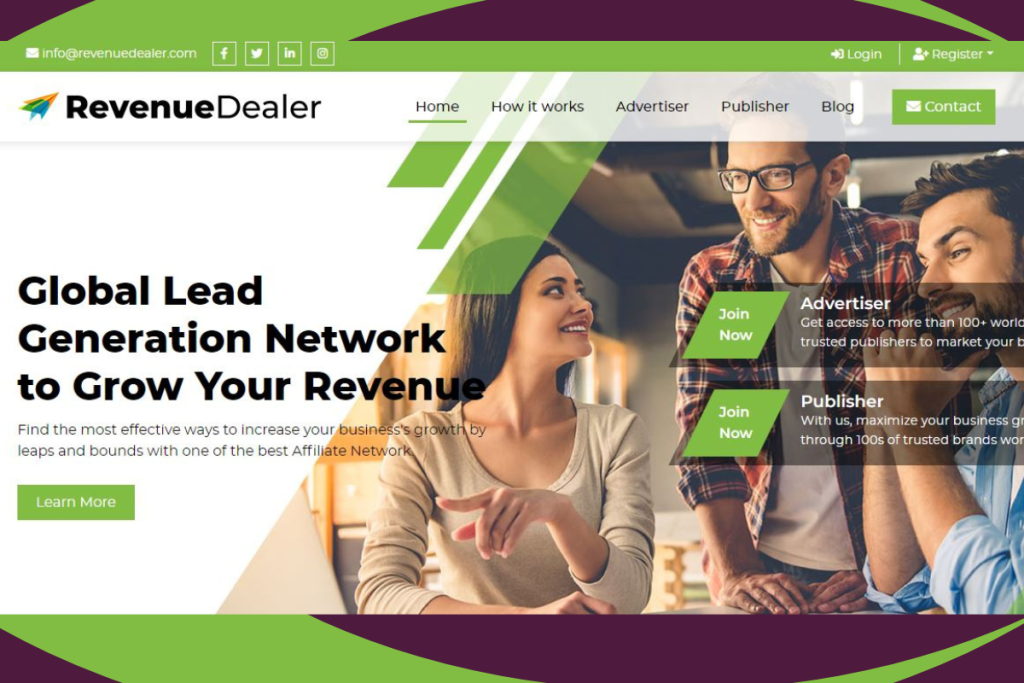Do you ever wonder how insurance agencies make money? For many of us, understanding the inner workings of this sector of the financial world can be somewhat mysterious. That’s why Revenue Dealer’s experts are here to cover everything from basic principles and underlying processes to innovative approaches for achieving success with an insurance agency.
In this ultimate guide, we’ll dive deeply into what it takes for insurance agents and companies to ensure long-term profits – giving you all the information needed for making smart decisions about your future investments in this field.
So sit back and get ready as we explore the fascinating dynamics behind today’s lucrative insurance industry.
Different Types Of Insurance Agencies

If you’ve ever shopped for insurance, you know that there are a variety of agencies out there to choose from. But do you understand the differences between them? It can be unclear, especially if you don’t have much knowledge about the insurance world. Let’s look at three common types of insurance agencies and what they offer: accident and health insurers, property and casualty insurers, and financial guarantors.
Accident & Health Insurers
As the name implies, accident and health insurers provide coverage for medical expenses due to an accident or illness. This type of insurance is often provided through employers or purchased by individuals. Accident and health policies usually cover hospitalization costs, doctor bills, prescription drugs, and more. They may also provide coverage for rehabilitative services such as physical therapy or occupational therapy. Some policies may even include coverage for long-term care in case of permanent disability or other extended medical needs.
Property & Casualty Insurers
Property and casualty (P&C) insurers provide coverage against accidents that can damage property or cause injury to people. This includes auto accidents, fire damage to your home, liability claims arising from personal injury lawsuits, and more. In addition, P&C policies typically cover theft, vandalism, and natural disasters such as floods or earthquakes. Depending on the type of policy you purchase, it can also cover legal fees associated with defending yourself against a claim made by another party.
Financial Guarantors
Finally, financial guarantors guarantee payment on certain obligations if the original debtor fails to pay them back. These obligations may include loans, bonds issued by governments or corporations, mortgages, and leases – basically any financial agreement where one party owes money to another party over an extended period. In exchange for guaranteeing these payments should they become delinquent due to defaulting borrowers, financial guarantors receive fees from the entities they guarantee payment to (such as banks).
No matter what type of insurance you need, there is likely an agency out there that can help meet your needs! Understanding the different types of insurers available will help ensure you get the best policy at the best price for your particular situation. Be sure to research ahead to know precisely which type of insurer will best suit your needs! The right insurer can make all the difference when it comes time to file a claim!
Also Read:
Top 10 Strategies To Grow Your Insurance Business
How Do Insurance Agencies Make Money | Revenue Deale’s Guide

Underwriting
Insurance agencies make money by underwriting policies: essentially, they analyze the risk associated with an individual or group of individuals and then decide whether or not to provide them with coverage.
This process can be complex since each individual’s circumstances must be considered, including their lifestyle, geographic areas exposed to hazards, age, credit score, and more. From there, the agency decides what coverage to offer and how much premium is necessary.
Policy premiums become an excellent source of income if the insurance company can properly assess risk and offer reasonable rates. But ultimately, insurance agencies rely on underwriting to make money.
Pricing and Assuming Risk
Another way through Insurance agencies makes money is by pricing their products — such as car insurance policies, homeowner’s insurance policies, and life insurance policies — and assuming the risk.
This is done by charging customers a lump sum or bringing in periodic payments, which allows an agency to earn a sustainable income over time. In addition, by evaluating risk factors, such as the location of a house or the safety of a vehicle, an agency can work out competitive rates that balance out their premiums with the potential cost of claims against those policies.
Of course, any possible profit from an arrangement depends on how well claims are managed; efficient management of those claims could lead to more significant profits for agencies.
Interest Earnings and Revenue
Insurance agencies make money by charging policyholders premiums for their coverage, but that’s not where the real money lies – in interest earnings and revenue. When an insurance agency collects annual premiums from policyholders, the money is placed in investments that generate interest for the agency.
Additionally, when their investments reach such a level of success, insurance companies can even benefit from opportunities to receive generous amounts of revenue, depending on how well their investments do.
Insurance agencies are getting paid twice: one directly from the policyholder’s premiums and another through interest earnings and revenue. It’s a savvy way of making money and keeping up with the latest investment trends.
Reinsurance
Insurance agencies make a significant portion of their money through reinsurance, an insurance policy for other insurance policies. When a consumer purchases insurance from an agency, the agency can purchase a reinsurance policy to protect itself from potential losses.
This allows them to reduce their financial risk should something go wrong while still providing coverage for their customers. With this additional layer of protection, many insurance agencies would stay out of business due to the potential financial burden that may come with covering large claims.
Reinsurance is often considered a win-win situation: offering security and peace of mind to consumers and agencies alike.
Evaluating Insurers
When it comes to making sure you’re getting appropriately covered, insurance agencies are the ones who have your back. They make money by evaluating the various insurers that customers can choose from to ensure they get protection at fair prices. So it’s worth going to an agency rather than dealing directly with an insurer.
They can save customers money by finding competitive quotes while still arriving at a policy that meets their coverage and budget needs. In addition, when shopping for insurance, going to an experienced professional can offer peace of mind that you’re getting the best thinking and guidance in taking out the proper coverage.
Coverage Lapses
Ever wondered what happens when you forget to renew your insurance policy? Unfortunately, your insurance provider still stands to make money from it. Insurance agencies generate income off of lapsed policies by charging a fee known as an “unearned premium” if the policy is canceled before its expiration date.
Too often, people believe they are saving money by not renewing their coverage, yet they may be costing themselves more. The unearned premium charged is calculated based on the amount that would have been earned over the remaining course of an expired policy and is generally a hefty price to pay for forgetting or neglecting to renew.
It’s always best to review available options before making any coverage decisions, as taking a moment now could save you from costly consequences later.
Cash Value Cancellations
Insurance agencies have long been aware of the potential goldmine of cash value cancellations. These cancellations generate additional revenue that helps agencies to stay viable in the ever-changing economic environment.
What makes this so attractive to insurance companies is that by canceling policies with cash value, they can use a valuable asset while still providing quality services to customers. This win-win results in greater profits for the agency and greater consumer satisfaction from customers feeling assured that their policyholder agreement was honored.
While it may seem lucrative for the agency, it’s important to remember that these transactions should be conducted fairly and ethically for everyone involved to benefit.
Related Article:
Top 10 Email-Marketing Tips For Insurance Agent
What Consumers Should Look For When Choosing An Insurance Agency

When choosing an insurance agency, there are many factors to consider. Therefore, it’s essential to research and finds a company that will provide the best coverage for your needs. Here are some tips by Revenue Dealer to help you choose the right insurance agency.
Do Your Research
Before committing to any insurance provider, it’s essential to do your research and compare different companies. Review customer reviews, read their policies and services, and compare quotes from various providers. This will help ensure you get the best deal for what you need.
Check Their Reputation
It’s also essential to check out an insurance agency’s reputation before signing up with them. Look for customer reviews online and ask other people who have experience with the company about their experiences. You should also ensure that the company is licensed in your state and has a good rating with Better Business Bureau. This will help give you peace of mind that you’re dealing with a reputable company.
Know Your Coverage Needs
Knowing exactly what coverage you need before signing up with an insurance agency is essential. Make sure that they offer all the coverage options you require, such as liability, comprehensive, collision, medical payments, etc., so that you can get the most comprehensive coverage possible for your needs. Also, check if any discounts or perks are available for specific policies or services to maximize your savings when signing up with them.
How Can You Be Sure You’re Getting The Best Rates On Your Insurance Policy

Shopping around for the best insurance policy rate can be a hassle. However, several strategies can be used to ensure you get the best rate on your policy.
- The first step is to research the different providers and their coverage options to ensure you select the right provider.
- Additionally, you must make comparisons by checking the rates of similar policies among different companies – this will help you narrow down your list of potential providers.
- Finally, consider using a broker or an online comparison tool for assistance. These services will provide an easy way to compare rates from multiple insurance companies without doing all the legwork yourself.
By utilizing these tips, you’ll be able to find an insurance policy with excellent coverage at a price that fits your budget perfectly!
What Should You Do If You Have A Complaint About Your Insurance Company

Insurance disputes can be highly stressful. You pay for protection, but getting the desired resolution cannot be accessible if things don’t go as planned. So if you’re dealing with a complaint about your insurance company and need help getting a fair outcome. Cheer up because the Revenue Dealer also has some practical tips on proceeding.
Understand Your Policy Terms
The first step in any insurance dispute is understanding what your policy covers and the terms of the agreement. Next, ensure you read through the fine print and know precisely what is expected of both parties. This will help you identify any discrepancies between what was agreed upon and what is delivered by your insurance provider. Knowing this information will also give you an edge when it comes time to negotiate with your insurer or file a formal claim.
Contact Your Insurer
If you have a dispute with your insurer over a claim or service issue. Contact them directly to start working towards a resolution. Don’t be afraid to ask questions or explain why you disagree. Most insurers are willing to work with their customers to reach an equitable solution. During this process, keep all communication organized, so it’s easy to refer back to if needed.
File An Appeal
If you have exhausted all other avenues of resolution, filing an appeal may be necessary. Appeals are usually handled by a special division within the insurance company that looks at cases more closely than regular customer service representatives do – this is where having organized communication from prior conversations will come in handy!
Additionally, ensure you understand the timeline for filing an appeal so that it does not become void due to too much time passing between initial contact and submitting paperwork for review.
Related Article: Increase Your Insurance Sales In This Digitize Age
How Revenue Dealer Helps Insurance Agencies To Make Money

Revenue Dealer helps insurance agencies make money by providing high-quality leads that can’t be found anyplace else. Our unique platform enables insurance agents to reach potential customers with a greater success rate than ever before.
We understand the need for dependable leads that result in sales, so we strive to provide the best quality leads available on the market. With Revenue Dealer, insurance agencies can tap into an endless supply of opportunities and maximize their profits from day one! So sign-up today and boost your business.









